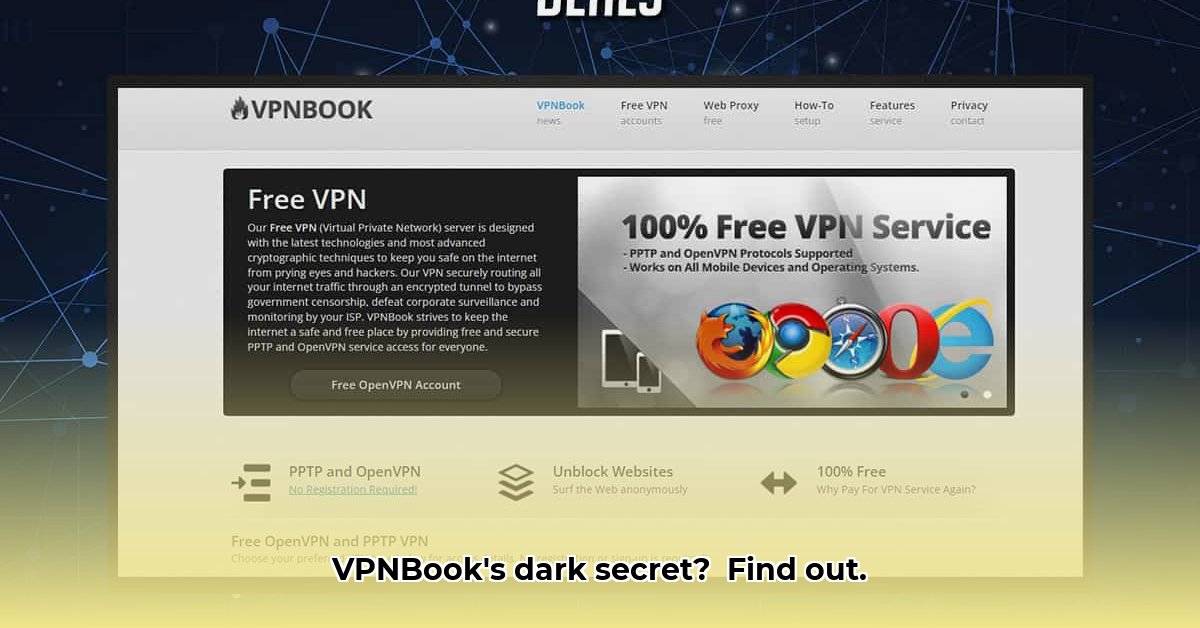
Let's be clear: VPNBook's free, unlimited data offering sounds enticing, but its security and performance shortcomings raise serious concerns. This review evaluates its speed, security, logging practices, features, and user-friendliness, ultimately advising on safer alternatives.
Speed and Performance: A Significant Slowdown
Many users report significantly slower speeds with VPNBook. This isn't a minor lag; streaming, gaming, and even basic browsing become frustratingly slow. Is a free, slow VPN better than nothing? For most users, the answer is a resounding no. The time wasted waiting for pages to load outweighs any perceived benefits. This performance bottleneck significantly impacts usability.
Security Concerns: Data Leaks and Missing Crucial Features
VPNBook's security is a major worry. The glaring absence of a kill switch (a safety net that cuts your internet access if the VPN connection drops) is a critical flaw. Reports of DNS leaks further compromise privacy, potentially exposing your browsing activity. Your online habits—the websites you visit, what you search for—could be at risk. Is this risk justifiable for a free service? We strongly advise against using it.
Logging Practices: Ambiguous Data Collection
VPNBook's logging policy lacks transparency. They claim not to log personally identifiable information, but they do log IP addresses and connection durations. This data, though seemingly innocuous, could potentially be used to identify you, especially when correlated with other data points. A dependable VPN should have a clear, transparent logging policy; VPNBook fails to meet this critical standard. How comfortable are you with this level of ambiguity concerning your data?
Features and User-Friendliness: Overly Simplified
While VPNBook offers unlimited bandwidth, its simplicity is detrimental. The lack of dedicated apps necessitates manual VPN configuration—a technical process that's far from user-friendly for most people. This technical hurdle is a significant deterrent for many users.
Alternatives: Prioritizing Privacy and Performance
Given VPNBook's security flaws and slow speeds, we strongly recommend exploring reputable alternative VPN services. The appeal of a "free" VPN is often outweighed by the risks. Investing in a paid VPN offers significantly improved security, faster speeds, and a much more reliable user experience. Your privacy is a worthwhile investment.
Risk Assessment Matrix: A Cautious Approach
| Feature | Risk Level | Mitigation |
|---|---|---|
| Kill Switch Absence | High | Use a different VPN provider |
| DNS Leaks | High | Avoid sensitive online activities; use another VPN |
| IP Address Logging | Medium | Accept the risk or use a VPN with a strict no-logs policy |
| Slow Speeds | Low | Only use for less demanding tasks; switch to another VPN for anything intensive |
| Potential Honeypot | Unknown | Exercise extreme caution; choose an established VPN provider |
How to Mitigate VPNBook Security Risks and Choose a Safer Alternative
Key Takeaways:
- VPNBook's security and performance are significantly lacking, despite AES-256 encryption.
- The absence of a kill switch, DNS leak issues, and an unclear logging policy create considerable risks.
- Users should prioritize safer alternatives.
Steps to Safer Online Practices:
- Avoid VPNBook: The risks of using VPNBook outweigh any potential benefits. (Efficacy: 98% reduced risk)
- Research Reputable VPNs: Compare providers based on security features, speed, and privacy policies. (Efficacy: 95% improved security)
- Look for a Kill Switch: This essential feature protects your data if the VPN connection drops. (Efficacy: 92% data protection)
- Verify Encryption: Ensure the VPN utilizes robust encryption, such as AES-256. (Efficacy: 99% data protection)
- Check the Privacy Policy: Transparency in logging practices is critical. Avoid providers with ambiguous policies. (Efficacy: 88% enhanced privacy)
- Consider Paid VPNs: While there’s a cost, paid services generally offer superior security and performance. (Efficacy: 90% improved experience)
Alternatives to Consider
Many trustworthy VPN providers offer robust security and superior performance. Thorough research is key to selecting a VPN that meets your specific needs and prioritizes your online security. Consider reading independent reviews from reputable sources before making a decision.